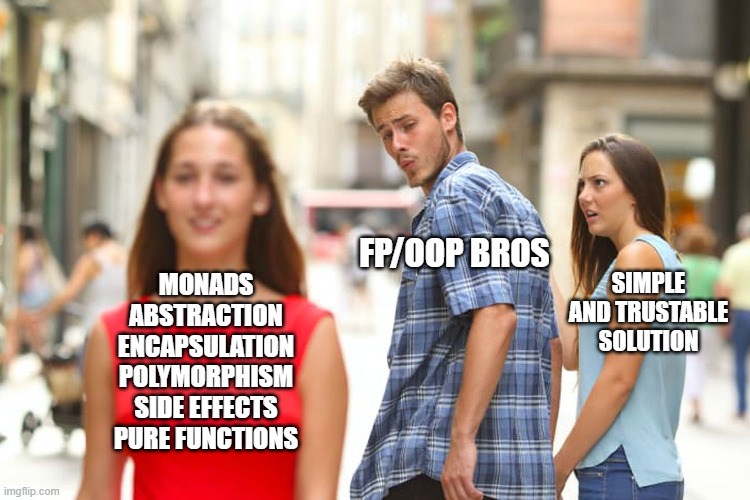The Pointlessness of FP vs OOP Discussions
In the world of software engineering, discussions about different programming styles are pretty common. The clash between Object-Oriented Programming (OOP) and Functional Programming (FP) often takes centre stage. Each camp claims its approach is the best, pointing to things like scalability, maintainability, and user-friendliness as key factors. But honestly, this debate tends to be more of a distraction than anything productive.
The real issue in programming isn’t about sticking to a specific style; it’s about understanding code as Data Flow. Grasping how data moves and gets processed in your system is way more valuable than arguing over whether a class or a reduce function is the way to go.
Average FP vs OOP Debate
This video perfectly sums up the average Functional Programming or object Oriented Programming Debate
Paradigms: Tools, Not Identities
Before we get into data flow, let’s take a moment to clarify our frameworks. Both Object-Oriented Programming (OOP) and Functional Programming (FP) are mental models that help us make sense of code. Think of them as tools rather than strict rules to follow.
OOP focuses on encapsulation and represents the world as a bunch of interacting entities (or objects). This approach works well in areas like UI design or game development.
FP, on the other hand, highlights immutability and composition, which often leads to clean and predictable transformations. This method is particularly useful in data-heavy fields like data pipelines or distributed systems.
The key takeaway is that these paradigms excel in certain situations but can fall short if applied too rigidly. Sticking to just one paradigm can distract us from the more important question: how does data flow through our system?
The Essence of Programming: Data Flow
Programming fundamentally involves three components: inputs, processes, and outputs. For instance, processing user data from a database to display on a webpage illustrates this concept. Regardless of whether you utilize Object-Oriented Programming (OOP) or Functional Programming (FP), the essential steps remain the same:
Input: Fetch data from the database.
Processes: Filter, sort, or format the data.
Output: Render the processed data through HTML.
Concentrating on how data moves and evolves within the system encourages you to think beyond mere syntax and boilerplate.
Understand dependencies.
Minimize unnecessary transformations.
Optimize for performance and clarity.
This perspective naturally integrates the strengths of both OOP and FP while avoiding their pitfalls.
Data Flow in Practice
Let’s consider a practical scenario involving the development of a recommendation system.
OOP Approach
You might create classes like User, Product, and RecommendationEngine. Each class has methods encapsulating behaviour, such as getRecommendations(). While this can work, it often leads to tight coupling and hard-to-follow chains of method calls, especially in systems with complex logic.
FP Approach
Alternatively, you can view the data as unchangeable structures and use functions to manage it. This approach can create clean and efficient pipelines. However, if you rely too heavily on functional programming, it may become confusing and require significant mental effort to keep track of what's happening in between.
Data Flow Approach
Instead of starting with paradigm constraints, begin by modelling the flow of data:
Data Collection: Aggregate user interactions and product metadata.
Processing: Utilize algorithms such as collaborative filtering or content-based filtering.
Delivery: Serialize the results and send them to the client.
Tools and abstractions, including classes, functions, and other types, should primarily facilitate this flow. By concentrating on the sequence of transformations, you can:
Simplify complex systems by dividing them into distinct, testable components.
Select the appropriate paradigm or library for each step.
Steer clear of early optimization and avoid making things more complicated than necessary.
Moving Beyond Paradigm Wars
The main point is simple: paradigms are not solutions; they are ways to understand problems. Sticking to one paradigm as the "right" way limits creativity and hides the real goal of programming, which is to solve problems effectively. By shifting focus to data flow:
Clarity Improves: Your understanding of the problem should align with its true nature, rather than being influenced by the peculiarities of established paradigms.
Flexibility Increases: You can take a hybrid approach by incorporating the best ideas from various paradigms.
Efficiency Gains: Enhancing data movement and transformation usually results in improved performance over sticking to arbitrary design principles.
Conclusion
The debate between Object-Oriented Programming (OOP) and Functional Programming (FP) highlights a basic problem: we often confuse tools with solutions. By seeing code as the flow of data, we can look past this simple argument and concentrate on what really matters. Instead of getting stuck in debates about paradigms, think about how data moves and how we can make that movement simpler and clearer. That's where real progress happens.
TL;DR
The ongoing debate between Object-Oriented Programming (OOP) and Functional Programming (FP) is pointless. It doesn't matter if you use FP or OOP as long as you solve the problem. Developers should focus on the main idea of data flow, which is how data moves, changes, and adds value to a system. By focusing on good data movement and transformation, we can make our projects clearer, more adaptable, and more efficient. Thinking about data flow helps programmers handle challenges more effectively.
